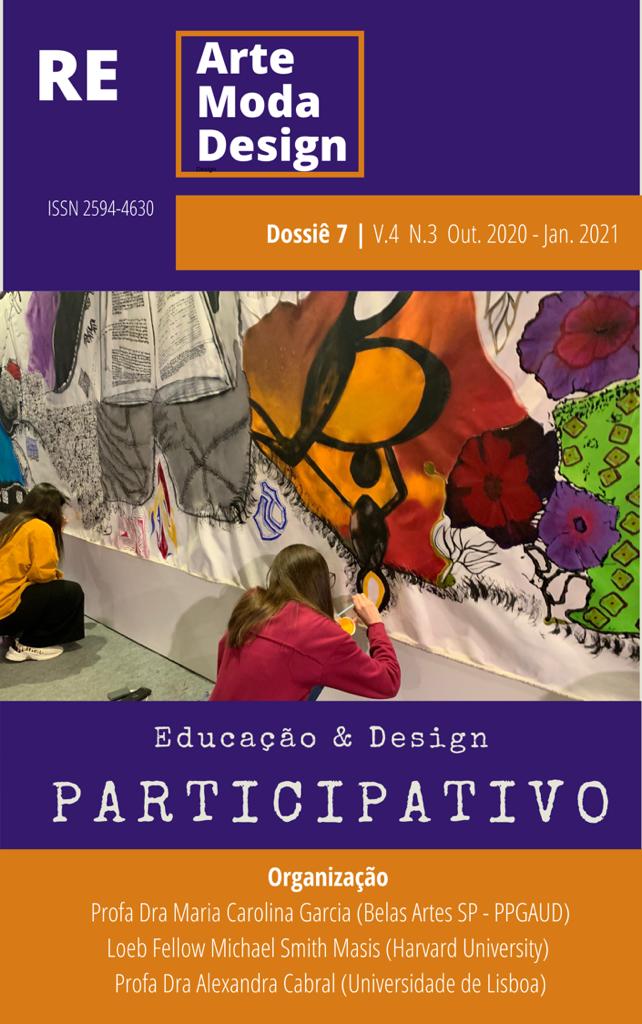CoDiseñando con Prácticas sostenibles en las Enseñanzas de Diseño de Moda
DOI:
https://doi.org/10.5965/25944630432020093Resumen
El tema de la sostenibilidad se presenta hoy como uno de los principales desafíos a los
que se enfrenta la sociedad hipermoderna. Los educadores y diseñadores de moda tienen
la oportunidad de adoptar un paradigma de diseño de moda, que se aleja de las estructuras
clásicas de la moda rápida y que puede guiarlos hacia un nuevo concepto de moda ética
y sostenible. Desde este enfoque es posible trabajar con criterios de diseño, fabricación y
consumo; pero también reactivar la longevidad de las prendas, mejorando la experiencia del
usuario y la consideración del residuo de moda. Nuestra investigación se basa en el concepto
de moda lenta y la aplicación de métodos de codiseño en las aulas, para alentar el desarrollo
de prácticas sostenibles y nuevos métodos colaborativos en la educación implicando, en el
proceso de generación y desarrollo, a diseñadores, investigadores, artesanos y diferentes
grupos sociales y organizaciones no gubernamentales.
El enfoque metodológico cualitativo se abordó desde la práctica del diseño participativo
en comunidades offline, donde se implementaron varias estrategias de diseño para la
sostenibilidad, tales como; técnicas de piratería, descodificación y recodificación de ropa de
segunda mano, todas ellas basadas en criterios de optimización y mejora de la calidad de las
prendas.
La muestra incluyó a 30 participantes divididos en 5 grupos, cuyos miembros adoptaron
diferentes roles y acciones dentro de los grupos. También se utilizaron varios instrumentos de
recopilación de datos que midieron los niveles de conciencia e impactos positivos sostenibles
en los participantes de los talleres.
Descargas
Citas
BIRTWISTLE, Grete.; MOORE,C.M Fashion Clothing-where does it all end up? International Journal of Retail Distribution Management, V. 35, n. 3, p. 210-216, 2007. Disponível em: https://www.emerald.com/insight/content/doi/10.1108/09590550710735068/full/html?src=recsys&
BLACK, Sandy. Eco-Chic: The Fashion Paradox. London: Black Dog Publishing, 2008.
CHEN,H.; BURNS,L. Environmental analysis of textile products. Clothing and Textile Research Journal. V.24, n. 3, p. 249-261, 2006. Disponível em: https://doi.org/10.1177/0887302X06293065
FAUD-LUKE, Alastair. Eco Design: The Sourcebook. London: Thames & Hudson, 2002.
FIORE, A.M.; LEE.S.; KUNZ, G.; CAMPBELL, J. R. Relation between optimum stimulation level and willingness to use mass customization options. Journal of Fashion Marketing and Management. V.5, n.2, p.99-107, 2001. Disponível em: https://doi.org/10.1108/EUM0000000007281
FLETCHER, Kate. Sustainable Fashion and Textile: Design Journeys. Earthscan. London: Sterling. 2008
FLETCHER, Kate. Slow fashion: an invitation for system change. Fashion Practice: The Journal of Design, Creative Process & the Fashion.V. 4, n. 2, p. 259-266, 2010. Disponível em: https://doi.org/10.2752/175693810X12774625387594
FLETCHER, Kate. Durability fashion, sustainability: The processes and practice use. Fashion Practice: The Journal of Design, Creative Process & the Fashion. V. 4, n. 2, p. 221-238, 2012. Disponível em: https://doi.org/10.2752/175693812X13403765252389
FLETCHER, K.; GROSSE, L. Fashion and Sustainability: design for change. London: Laurence King, 2012.
GALLOWAY, A., BRUCKER-COHEN, J.; GAYE, L.; GOODMAN, E.; HILL, D. Design for hackability. ACM. p. 363-366. ACM. 2004. Trabalho apresentado no 5th conference on Designing interactive systems: processes, practices, methods, and techniques.
ElSASSER, V. Textiles: Concepts and Principles. 3rd ed. New York: Fairchild, 2011.
PILLER, F.; SCHUBERT, P.; KOCH, M.; MÖSLEIN, K. Overcoming mass confusion: collaborative customer Co-Design in online communities. Journal of Computer- Mediated Communication, V.10, n. 4, p.00-00, 2005. Disponível em:
https://doi.org/10.1111/j.1083-6101.2005.tb00271.x
PINE, J. Mass Customization. Boston, MA: Harvard Business School Press. 1993.
POOKULANGARA, S.; SHEPHARD, A. Slow fashion movement: understanding consumer perceptions- an exploratory study. Journal of Retailing & Consumer Service, V. 20, p. 200-206, 2013. Disponível em https://doi.org/10.1016/j.jretconser.2012.12.002
SANDERS, E. B- N.; STAPPERS, P. J.Co-creation and the new landscape of design, Co-Design: International Journal of Co-Creation in Design and the Arts, V. 4, n. 1, p.5-18, 2008. Disponível em: https://doi.org/10.1080/15710880701875068
SANDERS, Elizabeth. B.-N. Design research. Design research quarterly, V. 1, n. 1, p.1-8, 2006a. Copenhagen, University of Art and Design
SANDERS, Elizabeth. B.-N Design serving people. Trabalho apresentado no Cumulus Working Papers, 2006, p. 28-33. Copenhagen, University of Art and Design.
SANDERS, Elizabeth. B.-N An evolving map of design practice and design research. Interactions, V. 15, n. 6, p. 13-17, 2008. Disponível em:http://grcd3021-f18.studiojunglecat.com/wpcontent/uploads/2018/08/LizSanders_AnEvolvingMapOfDesignPracticeAndDesignResearch.pdf
ULRICH, Pamela V.; ANDERSON‐CONNELL, Lenda Jo.; WU, Weifang. Consumer co‐design of apparel for mass customization. Journal of Fashion Marketing and Management: An International Journal, V. 7, n. 4, p. 398-412, 2003. Disponível em:
https://doi.org/10.1108/13612020310496985
VON BUSCH, O. Engaged design and the practice of fashion hacking: the examples of Giana Gonzalez and Dale Sko. Fashion Practice The Journal of Design, Creative Process & the Fashion, V. 1, n. 2, p. 163-185, 2009. Disponível em: https://doi.org/10.2752/175693809X469148
WU, Juanjuan. Co-design communities online: Turning public creativity into wearable and sellable fashions. Fashion Practice : The Journal of Design, Creative Process & the Fashion [online] V. 2, n. 1, p. 85-104, 2010. Disponível em: https://doi.org/10.2752/175693810X12640026716474
Descargas
Publicado
Versiones
- 2020-10-01 (2)
- 2020-10-02 (1)
Cómo citar
Número
Sección
Licencia
Derechos de autor 2020 Desamparados Pardo Cuenca

Esta obra está bajo una licencia internacional Creative Commons Atribución 4.0.
-
Los autores mantienen los derechos de autor y conceden a la revista el derecho de primera publicación, con el trabajo simultáneamente licenciado bajo la Licencia CreativeCommonsAttribution 4.0 Internacional, que permite:
1. Compartir — copiar y redistribuir el material en cualquier formato o soporte para cualquier propósito, incluso comercial.
2. Adaptar — remezclar, transformar y crear a partir del material para cualquier propósito, incluso comercial.
El licenciante no puede revocar estos derechos siempre que se respeten los términos de la licencia.Bajo los siguientes términos:
1. Atribución — Debe otorgarse el crédito adecuado, proporcionar un enlace a la licencia e indicar si se han realizado modificaciones. Esto debe hacerse en cualquier circunstancia razonable, pero sin sugerir que el licenciante aprueba el uso del material.
2. Sin restricciones adicionales — No se pueden aplicar términos legales ni medidas tecnológicas que restrinjan legalmente a otros hacer algo que la licencia permita. - Plagio, en todas sus formas, constituye un comportamiento anti-ético de publicación y es inaceptable. Esta revista utiliza el software iThenticate de control de semejanza".






